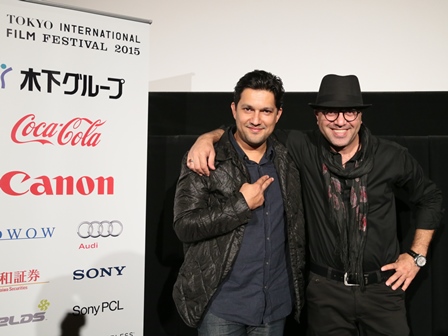An Iranian Tragedy – The Girl’s House

The Girl’s House, playing in the Competition section of the Tokyo International Film Festival, tells the story of a tragedy. A young woman dies the day before her wedding day. The film unfolds like a mystery. The question is why? Why did she die? Her friends, her family, the groom and his family hold some answers and hides other. Director Shahram Shah Hosseini and lead actor, Hamed Behdad visited the festival and talked about the film.
When asked about the meaning and the implicit criticism of Iran society in the film, director Hosseini replied, “Yes, this film is critical. Also this poses a very big question. I’m not giving any answers because each one of you should have a different answer for yourself. So I’m not trying to judge anything. I’m just posing this question and leaving the judgement and interpretation to each one of you.”
[Spoiler] In the film, the actions of the groom’s stepmother lead to the bride’s death – by suicide. Hosseini offered an explanation, “In Iran we are very proud of the fact that individuals from different social levels can get married. Different countries have different social roles and practices. From what I’ve learned from Japanese films, there are very strict traditions here. I’ve heard that there are big problems between wives and stepmothers. I don’t know if it’s still the happening. In this film I’m not trying to criticize traditions, but if you are going to follow a particular traditions you need to respect each other. And the problem here, in this film, is the stepmother’s behavior. That was the problem. If they had discussed things in advance, and thoroughly, then this tragedy wouldn’t have happened.”
Despite highlighting a tragedy, the metaphor is specific to a particular situation in the movie, not an indictment of Iranian society. The actor, Behdad clarified, “In Iran we had a revolution and people might think that we went backwards with society, but we all think that we are moving forward in a positive way. And I know that we can strike a balance in the future.”
When asked about his strategy for constructing the film – with flashbacks, multiple points of view and saving the major revelation for the end, Hosseini explained, “For this particular film, we had to tell a very simple story and in order to make it more engaging, we used flashbacks. For example, we showed the second part first, then go back to the first part to build suspense.”
The film’s title, The Girl’s House, is enigmatic. The film focuses on characters, but places are important. When asked what the title specifically refers to, Behdad didn’t reveal all, but opened up a possibility. He said, “I really want to ask everybody what they think the title, The Girl’s House, means to them. Because of course, I have the answer. But if I explain it, it might not be interesting. A house could represent a girl’s territory. I mean, a girl has a territory… in herself. There’s always a door in front of her territory and if you wanted to go inside, you need to knock and get approval to enter.”
The questions and issues around suicide are at the heart of the tragedy in The Girl’s House. Hosseini explained, “In Iran, family, religion and human relationships – caring for each other – are extremely important. And from a Muslim perspective, suicide is a sin. Apart from that, when thinking about your family, you’re not supposed to kill yourself because you should be thinking about helping each other and caring for each other. And so, if someone commits suicide, it’s a huge shock. In this film, we saved the shock of the girl’s suicide for the end. From the family’s perspective, they want to hide the fact the girl has died. Normally you would have to do the funeral, but they don’t hold the ceremony because one’s not supposed to kill one’s self.”
To add a little more clarity, Behdad added, “From a Muslim perspective, when you’re given life, you’re given an opportunity. And just because something happens, you should kill your opportunity. I think you should try and find some way to continue on with your life, because death will come to you and you don’t have to go and find death yourself.”
The Girl’s House is a profound, and profoundly moving film. It highlights a tragedy that is specific to Iranian experience, but carries a universal message of how a life, or rather, the end of life affects all who are left behind.
[Nicholas Vroman]






















